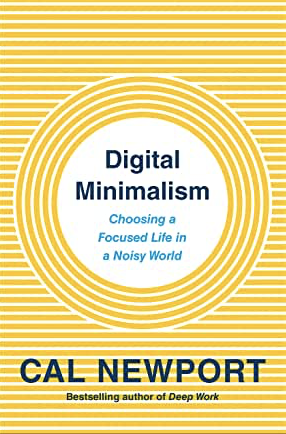The Viewpoint
Vol 1 Issue 3
- Book Review: Digital Minimalism

We are increasingly being bombarded with more and more technological inventions. Sure, some of these technologies do make life easier, but there is a lot of digital clutter in our lives. My main concern is that we’re becoming less human the more we interact with computers (programed by humans).
If you’re concerned about technology habits in your life, this is a good book to get you started on better boundaries. (Andy Crouch’s book, “The Tech Wise Family” is more geared towards families. That is also a good book on this topic.) - The Relationship in your Brain
Some interesting thoughts here from Fast Company about how to help our brains work in solving problems during emotionally difficult situations. The two parts of the brain that are at fighting for resources/energy: The limbic (fight or flight — our “autopilot” survival system) and the prefrontal cortex (strategy, reasoning, thoughtfulness). When we’re stressed, in conflict, or feel like we’re in danger, the limbic system takes over in order for us to survive. Especially in relationships that matter, this is not a viable long term solution.
The author talks about two key warning signs that we have moved into autopilot: Blame shifting, and negative assumptions. Both of these behaviors are about survival. The main problem with a survival first reaction: Everything and everyone is a possible threat. We may not cognitively think this, but our brain is reacting this way. I see this reality all the time in my work with couples. It is so easy to hear the threat and so difficult to actually listen to what’s being said.
When we go to the gym to lift weights, we are building muscle and endurance. The same concept is true for relationships. When we exercise setting aside our need for survival, we can grow in our ability to operate in both the limbic and prefrontal cortex in our life and relationships. - Leaving Social Media
Do you have FOMO (fear of missing out)? Can you imagine never again logging into facebook, instagram, snapchat, or twitter? This is a great op-ed about why this author decided to leave social media.
I’ve spoken and written about this before, but the great lie that social media promises is a more connected life. What it delivers is a more informed life at the cost of true connection with others. Humans don’t have the capacity to handle being omniscient (all knowing). That is a God attribute. Some studies are showing that anxiety/depression are linked to an increased use of social media.
The bottom line is that we all need better boundaries (on sex, food, work, social media, etc), which makes for better relationships in our lives. - Beauty From the Ashes
I’m sure you heard about this, but it is a story that is worth retelling. A Dallas police officer enters the wrong apartment, shoots and kills a man, and has just recently been convicted of murder and sentenced to 30 years in prison. The public got a surprise at the hearing when the victims brother took to the stand to say some final worlds to offender. This is an amazing picture of grace and mercy. Watch the video here.
The Viewpoint is a weekly roundup of content I have come across throughout the week that is worth reposting. This content will often be an article or a book I’ve recently read, or something else that is of cultural significance. One of my good friends talks about the word “viewpoint” as nothing more than a view from a point. When we change our point of view (or sometimes the point of our view — which is a different issue altogether), we can see differently. Relationships grow when we are open to changing our view.

